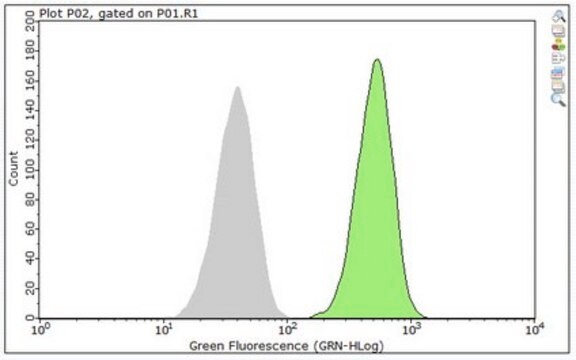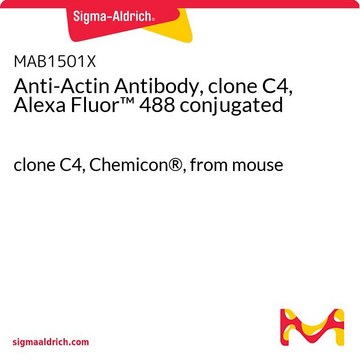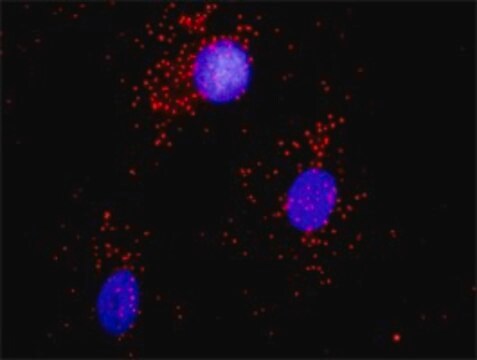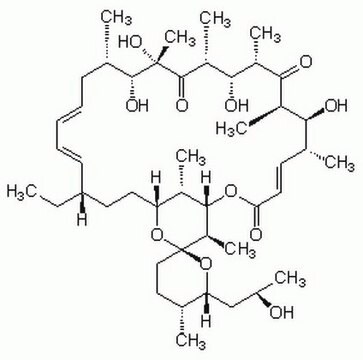Descrição geral
Actins are ubiquitous eukaryotic proteins that serve as a multi-functional, basic building blocks of cytoskeletal microfilaments. They play critical roles in a wide range of cellular processes, including cell division, cell migration, chromatin remodeling, trascriptional regulation and vesicle trafficking. These funstions are attributed to their ability to form filaments, which can quickly assemble and disassemble depending upon the needs of the cell. At least six different actin types have been reported in mammals. Although actins show about 90% overall sequence homology, isoforms do not show spatial, temporal and tissue-specific expression patterns and only 50-60% homology is found in their 18 N-terminal residues. Beta and gamma-actins, also known as cytoplasmic actins, are highly conserved in higher animals and are predominantly expressed in non-muscle cells where they control cell structure. Exocytosis, and motility. They are nearly identical proteins and differ only in four amino acids at the N-terminal region. The other four actin isoforms are typically found in specific adult muscle tissue types. Alpha-cardiac and alpha-skeletal actins are expressed in striated cardiac and skeletal muscles, respectively. Alpha and gamma actins are primarily found in vascular smooth muscle and enteric smooth muscles, respectively. It has been shown that under calcium-bound conditions, beta-actin exhibits more dynamic behavior than gamma-actin with higher rates of polymerization and depolymerization. Also, beta- and gamma-actins can readily copolymerize, and the resulting filaments exhibit polymerization and depolymerization rates that vary depending on the ration of beta- to gamma-actin (Lessard, JL.,et al.(1988). Cell Motility Cytoskeleton 10(3); 349-362.
Especificidade
MAB1501 is a pan-actin antibody that binds to an epitope in a highly conserved region of actin; therefore, this antibody reacts with all six isoforms of vertabrate actin (Lessard, 1988). Reacts with both globular (G) and fillimentous (F) forms of actin and does not interfere with actin polymerization to form filaments, at a ratio as high as one antibody per two actin monomers. However, this antibody does increase the extent of polymerization when used at a lower ratio of antibody to actin. In addition to labeling myotubes, anti-actin stains myoblasts and fibroblasts. Although clone C4 is prepared as an antibody to chicken gizzard muscles actin, it reacts with actins from all vertebrates, as well as with Dictyostelium discoideum and Physarum polycephalum actins (Lessard, 1988).
To date, all animal species and cell types with an actin form react by indirect immunofluorescence or immunoblot, including plant actin.
Imunogênio
Epitope is conserved in all known actins.
Purified chicken gizzard actin (Lessard, 1988).
Aplicação
Immunocytochemistry Analysis: A 1:100 dilution from a representative lot detected Actin in A431, and NIH/3T3 cells.
The unconjugated version of this antibody (Cat. No. MAB1501) has been demonstrated to perform in WB, ELISA, ICC, IF, IHC, IH(P).
Research Category
Cell Structure
Research Sub Category
Adhesion (CAMs)
This Anti-Actin Antibody, clone C4, Alexa Fluor™ 555 Conjugate is validated for use in Immunocytochemistry for the detection of Actin.
Qualidade
Evaluated by Immunocytochemistry in HeLa cells.
Immunocytochemistry Analysis: A 1:100 dilution of this antibody detected Actin in HeLa cells.
Descrição-alvo
40 kDa observed
forma física
Protein G Purified
Purified mouse antibody conjugate in buffer containing PBS, 15 mg/mL BSA, and 0.1% sodium azide.
Armazenamento e estabilidade
Stable for 1 year at 2-8°C from date of receipt.
Outras notas
Concentration: Please refer to lot specific datasheet.
Informações legais
ALEXA FLUOR is a trademark of Life Technologies
Exoneração de responsabilidade
Unless otherwise stated in our catalog or other company documentation accompanying the product(s), our products are intended for research use only and are not to be used for any other purpose, which includes but is not limited to, unauthorized commercial uses, in vitro diagnostic uses, ex vivo or in vivo therapeutic uses or any type of consumption or application to humans or animals.









